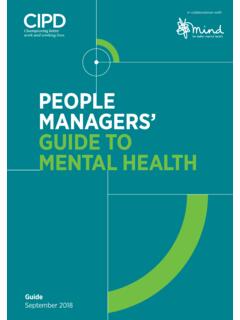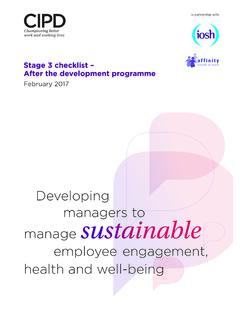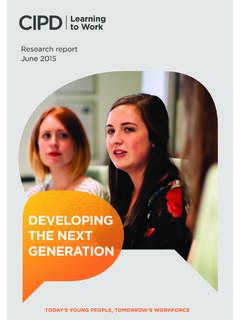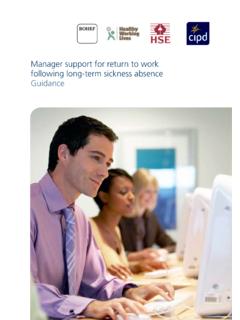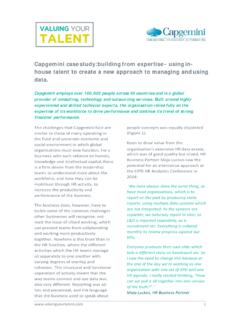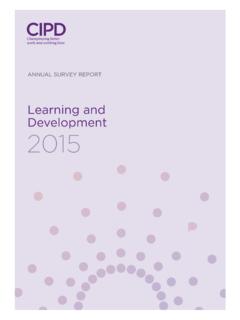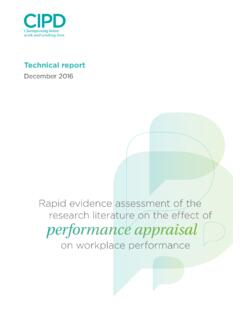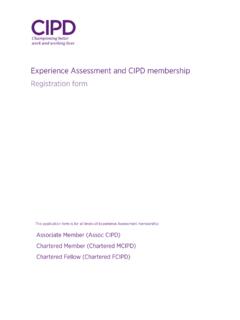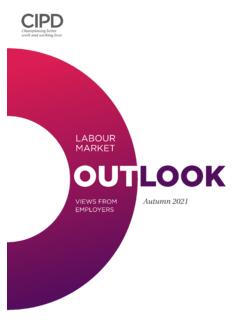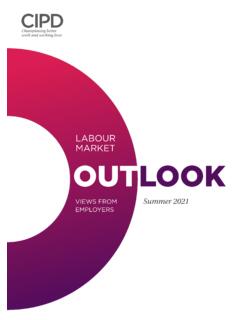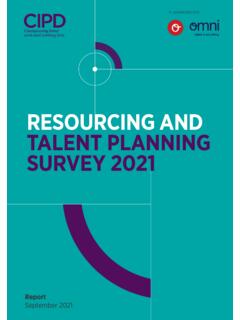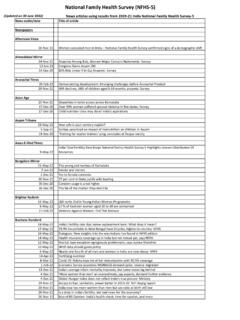Transcription of Resourcing and talent planning survey 2020 - CIPD
1 Resourcing AND talent planning survey 2020 Report October 2020in partnership withThe CIPD is the professional body for HR and people development. The registered charity champions better work and working lives and has been setting the benchmark for excellence in people and organisation development for more than 100 years. It has more than 150,000 members across the world, provides thought leadership through independent research on the world of work, and offers professional training and accreditation for those working in HR and learning and CIPD s Resourcing and talent planning survey , in partnership with Omni RMS, examines Resourcing and talent planning practices and the key challenges organisations are facing.
2 It provides people professionals and their organisations with benchmarking data on important areas such as recruitment costs, employee turnover and retention. The survey for this 2020 edition was conducted online and sent to people professionals and senior HR leaders in the UK. In total, 661 people and talent planning survey 2020 ReportResourcing and talent planning survey 2020 Contents Foreword from the CIPD 2 Foreword from Omni 3 Summary of key findings 5 Resourcing and talent practices in the current climate 9 Recruiting: the numbers 11 Attraction strategies 16 Selection and candidate behaviour 23 Recruitment difficulties 27 talent management, retention and turnover 31 Background to the survey 35 AcknowledgementsThe CIPD and Omni RMS are incredibly grateful to the organisations and individuals who gave their time and expertise to provide feedback to help inform this report.
3 These include: David Gawthorpe, Head of Resourcing , Stagecoach Group Plc Hannah Gooch, Senior talent Acquisition Manager, OVO Energy Jan Smallbone, Director of Learning and talent Development, Mitchells & Butlers Helen Starkey, Head of Strategic HR, Crown Prosecution Service Jo Taylor, talent Expert, Let s Talk talent Steve White, Head of Resourcing and Workforce planning , Crown Prosecution Service Sandy Wilkie, Associate, Greenhill HR and also to Annette Hogarth, research consultant, for analysing the findings and writing the informationWhen citing this report, please use the following citation: CIPD. (2020) Resourcing and talent planning survey 2020.
4 London: Chartered Institute of Personnel and and talent planning survey 20201 Foreword from the CIPDThe CIPD s Resourcing and talent planning survey , in partnership with Omni, is now in its twenty-first year. It is a valued survey with a sample this year of over 650 HR professionals. This is a challenging time for organisations experiencing the continued global impact of the COVID-19 pandemic. On top of that, the UK s transition period for leaving the EU will end on 31 December 2020, bringing with it implications for organisations and recruitment and talent practices. Our survey shows that COVID-19 has had an abrupt impact on the economy, workforce and Resourcing activity: almost a third of organisations have decreased their recruitment activity and over half have put it on hold.
5 Almost two in five anticipate a reduction in their recruitment budgets in 2020 21. In response to this ever-challenging backdrop, our findings suggest the importance of organisations focusing on the following four key areas. Taking a strategic approach to talent managementThe challenging climate, more than ever, requires organisations to take a strategic approach to their talent management and regularly evaluate their practices. Reassuringly, more than three in five organisations take a strategic approach to recruitment as part of a wider talent management/people strategy, but few organisations take a comprehensive data-based approach to improving their Resourcing decisions.
6 Few organisations currently collect and use good-quality data to forecast hiring demands, or assess the availability/supply of talent in the market. Furthermore, fewer than two in ten currently measure the return on investment of their recruitment processes. Broadening and diversifying talent poolsTwo in five organisations have recruited a more diverse workforce over the last 12 months compared with the previous year and over half have a formal diversity strategy. However, our findings suggest that most could improve the inclusivity of their recruitment processes through a more comprehensive approach that includes measures to eliminate bias. Our findings also show considerable variation in efforts to attract diverse candidates to board level.
7 Nearly two in five report that their organisation is only slightly active or not at all active in this area. Organisations need to place more focus on ensuring greater diversity throughout their organisations and that diversity and inclusion is a continued focus rather than an ad hoc skills in-houseThe challenging backdrop also means that organisations will need to place more emphasis on developing talent in-house. Skill shortages and lack of relevant experience are common causes of organisations recruitment difficulties. Encouragingly, many organisations are responding through developing more talent in-house, including upskilling existing employees to fill hard-to-recruit-for positions and sponsoring relevant professional qualifications.
8 Developing talent in-house enables organisations to tailor programmes to meet their specific skill requirements, decrease their reliance on the external labour market and reduce recruitment and retention considered use of technologyFinally, organisations are increasingly using technology to attract candidates. The top methods they find effective are their own corporate website and professional networking sites, such as LinkedIn. The proportion using technology to conduct interviews has continued to grow and more organisations are also conducting tests/assessments online. It s important, however, that tech recruitment solutions are tested to make sure they aren t Foreword from the CIPD3 Resourcing and talent planning survey 2020disadvantaging candidates and that they re accessible to all.
9 While technology itself is not a fix-all, the considered application of appropriate technologies can be hugely beneficial and cost-effective in improving recruitment forward, organisations need to continue to develop a thorough understanding of their existing talent profile and their current and future requirements. Collecting and evaluating data, and strengthening approaches based on the insights gained, is critical to maximise the effectiveness and efficiency of Resourcing strategies. It is also important to join up talent management practices in a strategic way from recruitment through to development, progression and the economic downturn intensifying pressure on resources, organisations will face increased impetus to ensure their people investments deliver in terms of performance and retention.
10 Claire McCartney, Senior Policy Adviser, Resourcing and Inclusion2 Foreword from OmniWe are pleased to partner with the CIPD to produce this crucial report that provides invaluable insight into Resourcing and talent planning trends at this critical point in our history. Before the world unwillingly entered into life with COVID-19, the outlook for the UK economy and employment was looking positive, despite uncertainty over brexit and its anticipated impact. The UK had reached its lowest levels of unemployment since the 1970s, with an applicant-driven market where the choice in roles meant they could command more competitive salaries, flexible working patterns, stronger training support and a full career development plan.
